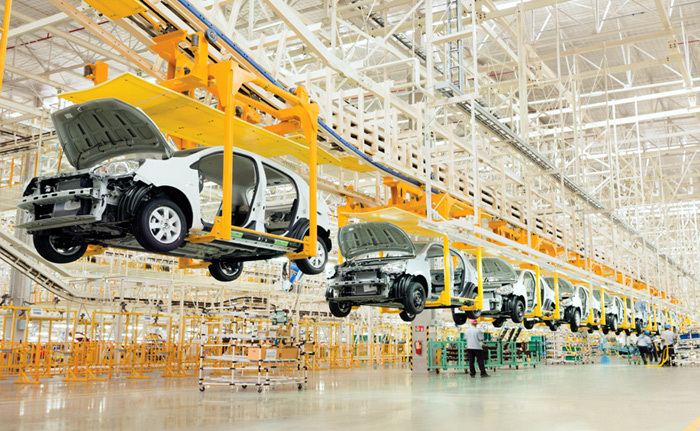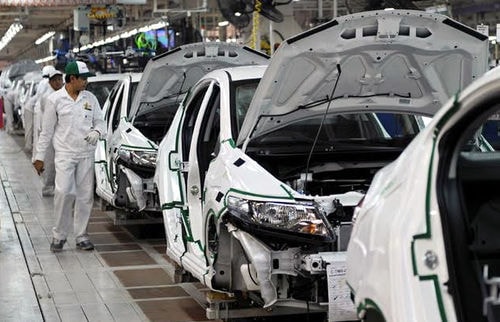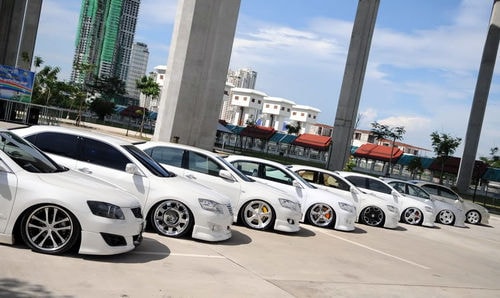Thai cars reduced prices by 40%, monopolizing the Vietnamese market?
By 2018, import tax will be 0%, special consumption tax will be 35%, the average price of Thai cars will be only about 7,100 USD/car, down about 40% compared to present. Cheaper price and Thai cars have the ability to monopolize the Vietnamese market.
According to data from the General Department of Customs, in the first four months of 2016, the country imported 29,054 cars of all kinds, worth nearly 733 million USD, a sharp increase in quantity and value compared to the same period last year. Of which, the largest number of imported cars came from Thailand with 10,155 cars.
Thailand Joy
This year, Thailand has taken the number 1 position in terms of imported cars to Vietnam. Meanwhile, at the end of 2015, this country was only ranked fourth among countries supplying cars to the Vietnamese market, after China, South Korea and India.
The most important reason for Thailand to take the lead in supplying completely imported cars to the Vietnamese market is the reduction in import tax rates. From January 1, 2016, the import tax rate for completely imported cars from Southeast Asian countries to Vietnam has decreased from 50% to 40%, making cars imported from Thailand have lower costs.
 |
Completely built-up cars from Thailand are expected to flood Vietnam. |
Thailand is the country with the most developed automobile industry in Southeast Asia, making it easy to import to Vietnam. Previously, due to high import tax barriers, this was a disadvantage, but from now on, things will be different.
In early 2017, the import tax rate for cars from Southeast Asia to Vietnam will continue to decrease to 30% and in early 2018 it will decrease to 0%. Meanwhile, the special consumption tax on cars will also change from July 1, 2016, with a reduction of 5% (from 45% to 40%) for cars with a cylinder capacity of 1.5L or less, then another 5% reduction (to 35%) in 2018 and cars with a cylinder capacity of 1.5L to under 2.0L will also decrease by 5% (from 45% to 40%) at this time.
That also means that completely imported cars from Thailand will have many advantages. According to businesses, if we temporarily calculate the current import price of cars of 5,000 USD/car for cars with cylinder capacity of 1.5L or less, plus 40% import tax, 45% special consumption tax (calculated at present) and 10% VAT, the price of a car with full tax is about 12,000 USD (not including other costs and business profits).
 |
Ford and GM factories in Thailand have a capacity 8-9 times greater than the domestic car consumption in this country, with surplus cars for export (illustrative photo). |
However, since 2017, this car model has had its import tax reduced to 30% and its special consumption tax reduced to 40%, so the price with tax is only about 10,400 USD and by 2018 when the import tax is 0% and the special consumption tax is 35%, it will be reduced further to only about 7,100 USD/car, a reduction of about 40% compared to the present, the car price will be much cheaper.
In Thailand, all car models produced have a maximum fuel consumption of 5 liters/100 km, meet Euro 4 emission standards, and have a localization rate of over 40%, so exporting to Vietnam does not face technical barriers.
Vietnam Sadness
In recent years, joint venture car manufacturing companies have continuously increased production capacity in Thailand. Excess production is exported.
Figures from the Federation of Thai Industries (FTI) show that while the Thai auto market declined by about 15% in 2015, exports increased by 6.4%. This year, Thai auto exports are expected to increase at the same rate as last year.
A number of famous Japanese brands have committed to making Thailand their main manufacturing hub in Southeast Asia and their largest manufacturing base after Japan.
Manufacturers in Thailand have recently developed a strategy to expand exports to Southeast Asian countries by simultaneously establishing a business department specializing in monitoring automobile export activities to Cambodia, Laos, Myanmar, Vietnam and the Philippines, etc. to research the market and policies to advise leaders on boosting automobile exports.
 |
| Thailand has long been famous for producing quality goods, so it is understandable that Vietnamese people trust cars. |
Vietnam is gradually entering the period of automobile socialization, when cars are no longer a valuable asset or means of transportation for a few people but have become popular. The potential of the Vietnamese automobile industry is huge. The rate of private car ownership in Vietnam is still below the average compared to other countries in the region with about 20 cars/1,000 people (equivalent to Thailand 15 years ago). The living standards of Vietnamese people are increasing, and the number of car owners is also increasing. According to forecasts, the rate of private car ownership in Vietnam may increase to 40 cars/1,000 people by 2025.
However, experts are concerned that Vietnam will soon become a major auto export market for Thailand. Thai models with cylinder capacity of 2.0L or less will flood Vietnam. In 2015, we spent 3 billion USD to import complete cars of all kinds, of which Thailand alone spent more than 400 million USD. Forecasts show that auto import turnover will increase sharply, possibly reaching nearly 10 billion USD by 2030.
The reduction in import tax on completely built-up cars has contributed to making the supply more abundant. Consumers will benefit, but sadly, a large-scale market with billions of dollars each year is "given" to Thailand, helping the country's automobile industry to grow more and more. On the contrary, the domestic automobile manufacturing industry will stagnate, many workers will lose their jobs. Along with that, Vietnam must prepare a large amount of foreign currency to meet the annual demand for car imports.
According to Vietnamnet
| RELATED NEWS |
|---|

